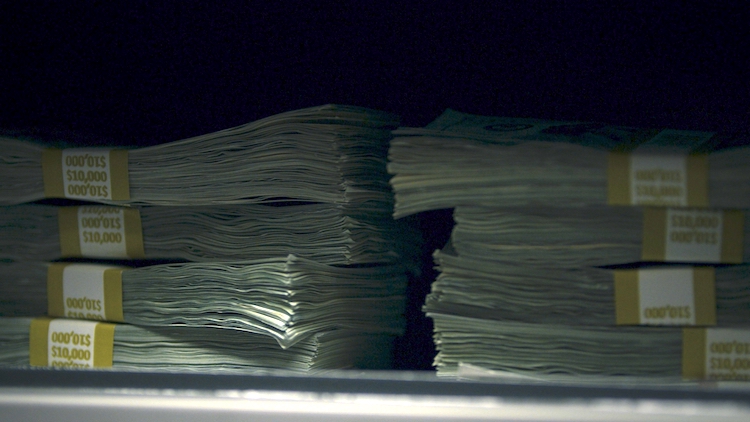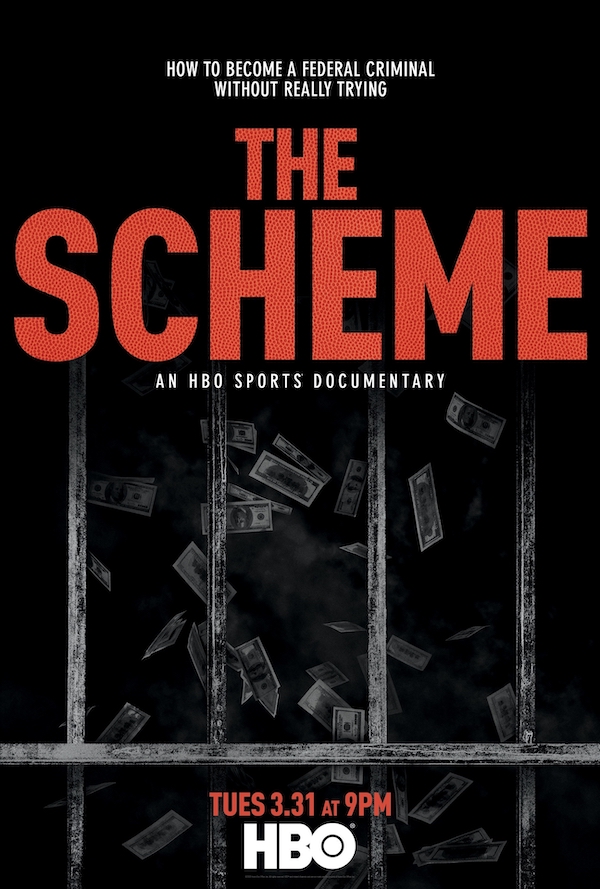HBO’s 'The Scheme' looks at corruption and college sports

The Scheme initially aired in March of 2020, and according to the official website, it “tells the revealing, no-holds-barred tale of Christian Dawkins, the young man at the center of one of the biggest criminal cases in collegiate sports history.” Photo courtesy of HBO/WarnerMedia.
I was an athlete when I was younger, playing baseball and football all through school. Even now, I still love the mental and emotional clarity physical activity brings. More than that, though, sports allow me to set aside time to share a common bond with the ones near my heart but distant in location. I cherish the group FaceTime calls with my pops and cousins (who live in Texas) as we complain about the Dallas Cowboys on a beautiful fall afternoon, for example.
It’s currently NBA playoff season, though, so those calls will have to wait. My home state Oklahoma City Thunder didn’t even sniff the postseason, so we’re all looking forward to greener pastures. Still, that didn’t stop one of my cousins from reaching out to me regarding NCAA basketball. He’d come across a documentary, and wanted to know whether or not there was a law against paying prep athletes. I told him I wasn’t aware of one, but I figured I should look into the issue in more detail.
Delving into ‘The Scheme’
The fantastic team at HBO Sports produced the documentary he referenced. The Scheme initially aired in March of 2020, and according to the official website, it “tells the revealing, no-holds-barred tale of Christian Dawkins, the young man at the center of one of the biggest criminal cases in collegiate sports history.” It comes in at just under two hours and is currently streaming on HBO Max.
The tone is set from the opening credits, as a telling quote from former University of Nevada, Las Vegas basketball head coach Jerry Tarkanian greets the audience: “Nine out of 10 schools are cheating. The other is in last place.” Based on the inferences one can draw from The Scheme, it appears that Tarkanian’s sentiment wasn’t too far from the truth.
Very early in the documentary, the production team—who tells the story through first-person interviews conducted with Dawkins and others—asks Dawkins point-blank: “Did you do anything wrong, Christian?” From the beginning, it is clear that Dawkins is somewhat of a victim in the plot. As a young man who had garnered a deep understanding of the high school and college basketball scene from a young age, Dawkins quickly made a name for himself in the realm of prep hoops.
By the age of 12, Dawkins had already created a website by which he scouted middle school and high school prep athletes. His parents discuss remembering the letters their son would receive in the mail stuffed with checks from college coaches at $600 apiece—the price of a subscription to his website. By 17, Dawkins had already brokered a deal with Under Armor to sponsor the AAU basketball team he managed.
As such, Dawkins begins his early adulthood with the proper pedigree in place to move forward with his hopes of becoming a sports agent. He initially begins working with a firm, helping them sign athletes through the tried-and-true method of funding players and their families in the hopes they will eventually sign with the respective agency. And if that was all he did, he may have never been charged with multiple federal felonies.
 Photo courtesy of HBO/WarnerMedia.
Photo courtesy of HBO/WarnerMedia.
Corrupting college athletes is wrong, but is it illegal?
However, according to Dawkins, “the business model of financing prospects before they actually turn pro is 100% a gamble.” In theory, you could fund them for years and still find yourself in a situation where the prospect doesn’t decide to sign with you, or perhaps they sign and then quickly leave for greener pastures. Knowing the stakes, it’s hard to blame Dawkins for wanting control over the interactions with the players and their families. There is a personal connection that has to be fostered and tended.
That desire, in addition to a few other developments, led Dawkins to start his own management company. His new partners in the endeavor, including a shady money man, want to begin paying college coaches to generate an extra layer of leverage. Dawkins resists, though. Up until this point, he has only paid the players and their families.
Ultimately, his new partners (who are funding the company) demand to pay the coaches … because the “partners” are undercover FBI agents. The agents view the coaches as “public officials,” so forcing this new structure sets up a situation in which Dawkins is now implicated in bribing public officials for favors, i.e., pushing the players to his management company. In a compelling twist, Dawkins never follows through on paying the coaches, though; he is literally on recorded calls stating point-blank that he’s not going through with the new plan and that he is “trying to do things the right way.” Be that as it may, Dawkins is eventually arrested and charged.
According to The Scheme, Dawkins was charged with various counts of bribery conspiracy, payment of bribes, honest services fraud, honest services fraud conspiracy, wire fraud, wire fraud conspiracy, Travel Act conspiracy, and money laundering conspiracy. At his first trial, the government convicts Dawkins of wire fraud and conspiracy to commit wire fraud. The judge sentences him to six months in prison for “defrauding” the universities. At his second trial, the prosecution convicts him of conspiracy to commit bribery and bribery, resulting in a sentence of 12 months and one day in prison.
As Dawkins correctly notes, no law explicitly states that breaking an NCAA rule is a federal crime. At the end of the day, though, the feds can craft almost any unsightly activity into a federal offense. Regardless, due to these convictions, there is now precedent for charging someone with federal felonies for paying or otherwise causing a student-athlete to become ineligible for an athletic scholarship—the logic being they have defrauded the school that offered the scholarship in the first place.
Oddly enough, one could give the same amount of money to a high school prospect who wants to eventually go to the NBA G League instead of college (as prep players are starting to do these days), and it’s no issue. Same morality but different criminality. It’s a difficult distinction to comprehend.
The impact of college sports on the law
Nevertheless, it isn’t simply those who “interfere” with collegiate athletics that suffer the often-inequitable application of the law’s wrath. After all, research has shown that college sports can have an unjust effect on the sentences some offenders receive, even if they (or their crime of conviction) have no relationship to athletics whatsoever.
Specifically, a study from 2018 published in the American Economic Journal: Applied Economics analyzed “the effects of emotional shocks associated with unexpected outcomes of football games played by a prominent college team in the state.” The study found that unexpected losses increase the length of sentences handed down by judges during the week following the loss. Moreover, the impact on the sentence was found to be more significant if the judge received their bachelor’s degree from the losing football team’s university.
The authors collected information from 1996 to 2012. When the study was merely a working paper in 2016, the Washington Post reviewed the analysis. It explained that, after an upset loss, judges recommended sentences that were on average about a month longer (or 7% more) than the mean. Sadly, this trend disproportionally affected Black defendants.
There’s no doubt that college athletics have a stronghold on our society. Still, it seems the “corruption” associated with them is apparently much more widespread than paying prospects or picking and choosing who and what to prosecute.

Adam Banner
Adam R. Banner is the founder and lead attorney of the Oklahoma Legal Group, a criminal defense law firm in Oklahoma City. His practice focuses solely on state and federal criminal defense. He represents the accused against allegations of sex crimes, violent crimes, drug crimes and white-collar crimes.
The study of law isn’t for everyone, yet its practice and procedure seems to permeate pop culture at an increasing rate. This column is about the intersection of law and pop culture in an attempt to separate the real from the ridiculous.



